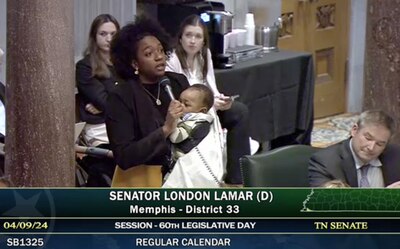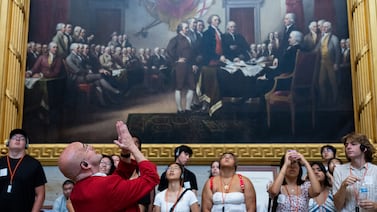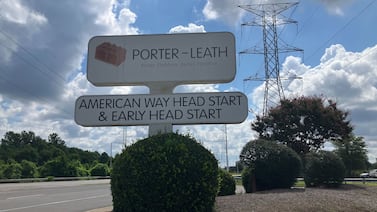Amid outbursts from gun control advocates in the spectator gallery, Tennessee’s GOP-dominated Senate passed a bill Tuesday to allow some teachers and staff to carry concealed handguns in public schools.
The vote was 26-5 vote along partisan lines.
Lt. Gov. Randy McNally ordered the gallery cleared of protesters after issuing several warnings before the vote, but many of them refused to leave, despite the urging of state troopers and warnings that they could be arrested.
Some held up signs that said “We’re still here” and “1 year later, are kids safer?” referring to Nashville’s Covenant School shooting, in which an intruder killed three children and three adult staff members on March 27, 2023.
Others chanted “Vote them out!” and “Let them teach!” as it took nearly 15 minutes to resume debate.
“People were damn mad,” Nashville mom Carol Buckley Frazier told Chalkbeat later.
“Some wonderful amendments were introduced to try to craft something better out of a horrific bill, but every one of them got tabled by the Republican supermajority. We just couldn’t believe it,” said Frazier, who came to the state Capitol to show her opposition to the bill.
A group of parents from The Covenant School were also in the balcony but were allowed to stay. Wearing school colors or with ribbons pinned to their chests, they have had a steady presence on Capitol Hill since the shooting to meet with legislators, attend committee meetings, and advocate for gun reforms.
The legislation still awaits a vote by the full House. If it passes there, Tennessee will be on the verge of enacting a law that most teachers and parents oppose.
The latest results from the annual statewide poll conducted by the Vanderbilt Center for Child Health Policy found that school safety is one of parents’ top education concerns, but significantly fewer parents said yes when asked if schools are safer when teachers are armed.
However, some rural lawmakers have sought the measure for a decade to help districts that can’t place an armed law enforcement officer on every campus, most recently due to a shortage in the profession.
The bill, co-sponsored by Sen. Paul Bailey of Sparta and Rep. Ryan Williams of Cookeville, lays out specific conditions before any school employee could carry a concealed handgun if they’re not a law enforcement officer.
First, the local district and law enforcement agency would have to agree to pursue such a policy.
Second, interested teachers and school staff who have an enhanced handgun permit would have to complete 40 hours of certified training in school policing at their own expense, and pass a mental health evaluation and an FBI background check. That training would have to be renewed every year that the teacher was carrying.
Parents would not be notified if their child’s teacher is armed. And one provision of the bill shields districts and law enforcement agencies from potential civil lawsuits over how a teacher or school employee uses, or doesn’t use, a handgun under the proposed law.
In remarks on the Senate floor, Sen. Raumesh Akbari, a Memphis Democrat, noted the irony of any legislation blocking a parent from being notified about a gun in their child’s classroom, given the many GOP-backed laws passed in recent years to restrict curriculum and library materials under the banner of parental rights.
And Sen. London Lamar, another Memphis Democrat, gave an impassioned speech while holding her 8-month-old son.

“I’m upset. My child is at risk under this bill,” Lamar said. “This bill is dangerous and teachers don’t want it. Nobody wants it.”
Bailey, the Senate sponsor, said the provision about not notifying parents is intended as a deterrent to potential intruders who would not know who is armed and who isn’t.
Any liability for an accident would be borne by the teacher who chooses to carry a weapon under the law, he said.
Sen. Ken Yager, a Kingston Republican, spoke in favor of the bill.
“We are not trying to shoot a student,” he said, “but protect a student from an active shooter whose sole purpose is to get into that school and kill people.”
But Claire Jones, a Williamson County mom and hospice nurse who was at the Capitol on Tuesday, saw it differently.
“When you ask for stricter gun legislation and they actually loosen the laws, that feels intentional,” said Jones, who is running as a Democrat for the House seat currently occupied by Republican Rep. Gino Bulso.
“How did we come from a tragedy like Covenant to this point?” she asked.
You can track the bill’s status on the General Assembly’s website.
Marta Aldrich is a senior correspondent and covers the statehouse for Chalkbeat Tennessee. Contact her at maldrich@chalkbeat.org.







